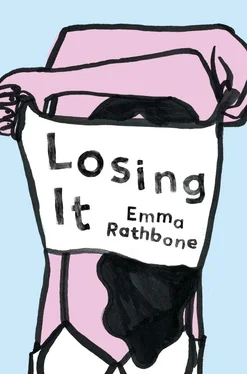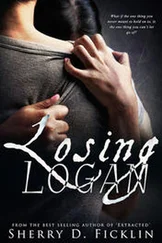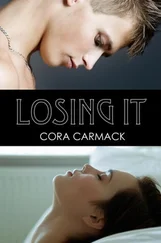For a moment, it was like I could see it all, finally — Viv, lit like a sunrise splashed across the sky, every filament of her, the exact torn way in which she was gorgeous. She was strong, strange, gifted, forgiving. I knew, with a pain, that she would forgive me. I knew, in a way, she already had. What she’d seen and understood about me this summer I’d never know. But she had seen it, and forgiven me for it and I hadn’t done her the same service. I hadn’t seen her whole. I wanted to tell her, so badly, how much I admired her. I wanted to tell her how I’d had it all wrong.
Instead I watched as she rose and walked unsteadily out of the room. Outside the window the sky was turning a lighter purple. For the first time, I realized there was a chill in the air.
I got up and I caught her just as she was about to go up the stairs. “Aunt Viv,” I said. She stopped but barely turned to me. “About the plates. About last night.” She winced. Her lip quivered. Finally, hotly, it surfaced inside me. “I’m so sorry. I’m so very sorry, about everything. If I could go back — I would do anything. I would do anything to be able to go back.” She hesitated for a moment, and then continued on her way up, and into her room.
“This is Pete Wexler,” said a man on the other end of the phone. I could hear traffic in the background. I pictured a short man, in a white linen suit, wearing vintage buttons on the lapel, staring into the dusty window of an antiques store.
After Aunt Viv went up to her room, I sat at the table for a long time. The house was silent, as if nothing had happened. Slowly, by grades, the kitchen filled with morning light. I went outside to the car and opened the trunk. I hauled out the crates of broken glass and put them on the front porch. I carefully took out the dusty pieces, one by one, and laid them on the floor.
“My name is Julia Greenfield,” I said.
“Yes?” said Pete, in a slightly hassled tone. Blaring atmosphere on the other end. It sounded like he was in rush hour in Hong Kong.
“I’m the niece of Vivienne Greenfield,” I said. “From last night, with the plates.”
“I’m sorry?”
“The McCormick Center,” I said. “Last night? You went to see Vivienne Greenfield’s plates?”
“Yes, okay.”
“I’m her niece.”
A siren blared and then receded.
“Look, what can I do for you?” he said.
Not every single plate was broken. And some of them were only in two pieces. As I laid them on the floor, I realized it wouldn’t be that hard to put some of them back together, if they’d cracked in a clean way. I could see the new series that Viv had been working on, the Knights of the Round Table. They were all in dappled, colored shards, but when you put them together you could imagine how they would have been. The plates had a gold trim, and cursive writing on the bottom. They depicted knights in detailed finery sitting on their horses, women in pastel dresses dancing around a maypole. There was one of a row of hanging flags against a gray brick wall. And one of a field, dotted with wildflowers, in front of a castle. They were all in Viv’s childlike, measured style.
Now, pacing in my room, talking to Pete Wexler, whose number I was finally able to track down, I had a bad feeling in my stomach. In the bleating light of day, the feeling of what I’d done was not going away, not at all. It was humid, and the floorboards creaked as I walked around. I knew if I opened the window I would just let in hot air like a dog’s breath.
“It was my fault,” I said to Pete Wexler. “I’m the reason she didn’t have her plates. I got into an accident and didn’t show up.”
“Well…” he said, unsure, impatient.
“And so I’m calling because I wanted to see if there was any way— Are you still here in town? Or if you could come back. Or if you’ll be back in this area anytime soon.”
“If I’ll be back in Durham?”
“Yes.”
“Well, it’s possible. I’m not sure.”
“There’s got to be a way for you to see them again. Have you seen her website? Last night couldn’t have been the only chance.”
“Yes,” he said. “Possibly. I don’t know.” A car horn. Someone shouting on the street.
“If you come back — we’d love to have you for dinner. We could show them to you, or…”
But he was saying something. “… maybe relocated to another store, we’re expanding, so I’m not sure if I’ll be touring the South again next summer. But we’re always on the lookout. Look, do you— Is there anything else?”
“Oh,” I said. “So — wait.”
“Because I’m in the middle of something here. I really have to go.”
“Okay. Okay.”
—
“Have coffee with me” is what the e-mail from Elliot, which I received later that night, said. I stared at the screen for quite a while. The truth is that I was already formulating a plan.
I hadn’t gone in to work since I’d sent the e-mail, and hadn’t received any phone calls from the office asking where I was.
After talking to Pete Wexler, I’d called a few other home-goods and decorative-arts stores, asking if they were interested in a local artist’s work, if they sold things on consignment, but I hadn’t had any luck. I’d gone back out to the front porch, and on a different part, laid down some newspaper. And then I hunched over the pieces of the plates and tried to put back together what I could with superglue. I was able to salvage the one of the cliff in the ocean, a few of the Wild West ones, and three of the Knights of the Round Table series. A few more came together. They had seams going down them where they’d cracked, but it wasn’t too noticeable. By the end, standing back, I saw that there were enough for some sort of display, some sort of show. I’d get them put up somewhere. There could still be an event.
When I got the e-mail from Elliot it fell into place. What I needed was someone who knew about local art galleries.
He suggested we meet at five o’clock the following afternoon, at a rooftop restaurant that overlooked the marquee of an old movie theater. When I arrived, there were tall potted plants in the corners and a couple of old people in linen shirts drinking wine. I pulled an aluminum chair across the concrete.
“I’m so sorry about that e-mail,” I said as I walked up to him, before I could lose the courage. He was sitting in the sun, in a relaxed manner, squinting at me.
“It’s fine, it’s fine,” he said, putting his hands up in a placating gesture.
“I don’t know what I was thinking.” I sat down and put my bag under the table.
“I admire you,” he said. He was smiling, like he was happy to see me.
“You do?”
“People don’t usually do stuff like that.”
“Really?” I said. “You don’t get e-mails like that every day?”
He laughed. “Let’s just say you’ve given Jeannette something to talk about for the rest of her life.”
I looked down at my plate. It was shaped like a seashell, or a palm frond. I couldn’t tell.
I said, “I don’t want people to think— I thought I’d e-mail them, Kramer at least, and tell him that there was never anything between us. That you never did anything like that. I don’t want them to assume…”
He looked anxious; he was shaking his head.
“No, no,” he said. “You did me a favor.”
“I did?”
He sighed sadly. He looked to the side. “Yeah,” he said. The waiter came with two glasses of water. It was quiet for a few moments. He turned back to me. “I’ve been divorced for two years.”
It took me a second. “What?”
“That’s what I was trying to tell you.”
“Wait, you have?”
Читать дальше
Конец ознакомительного отрывка
Купить книгу












